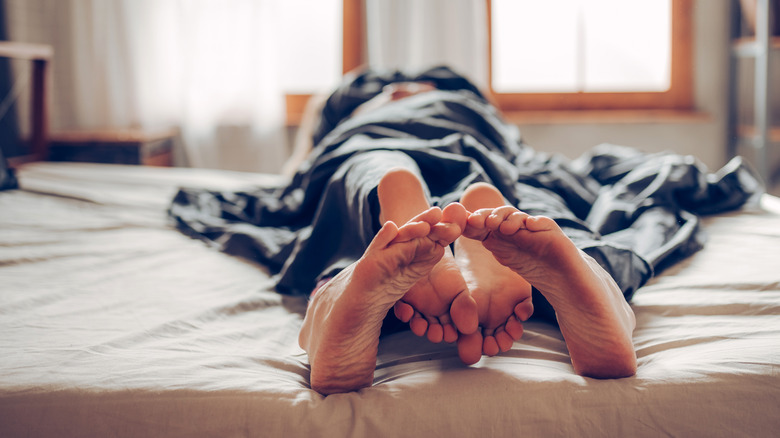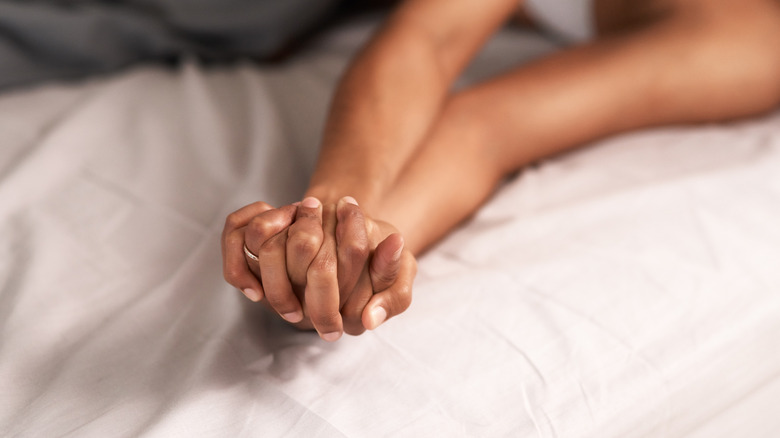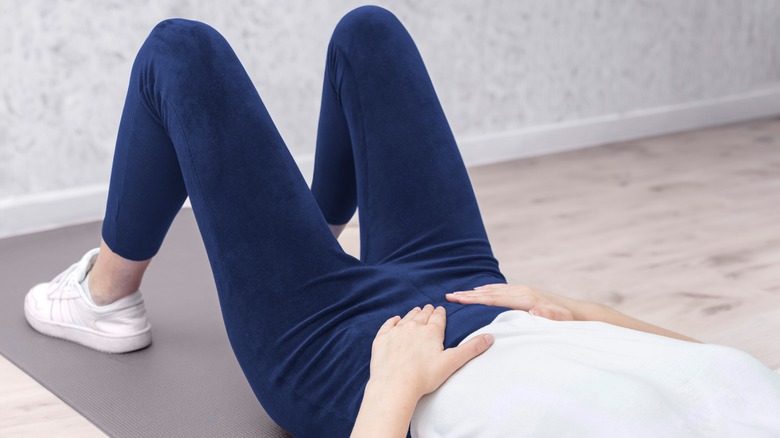When You're Having Sex, This Is What Happens To Your Muscles
When you're in the height of passionate intimate time with your significant other, you're probably only focused on the sensations you're feeling physically, mentally, and emotionally. Sex, when done correctly and under the right circumstances, can be immensely pleasurable for most people.
There are also a lot of surprising things that happen to your body during sex, like a speeding heart rate, flushing skin, or swelling nether regions. Did you know that your muscles go through a series of changes too? And no, we're not talking about the workout you're getting while trying out different sex positions (although that does count).
We're referring to what happens to your muscles by way of contraction and release through the (typically) four stages of sex: desire, arousal, orgasm, and resolution. The first two stages are also referred to as excitement and plateau by 1966 sex researchers William Masters and Virginia Johnson. Even though you might associate sex as an activity that enhances relaxation, during these stages, your muscles actually go through a process of tensing and relaxing to accompany the different physiological changes that come with intercourse. Here's how that happens.
Your muscles start by tensing up during the first stage of sex
When you're excited or experiencing desire for your partner, your heart rate and breathing accelerate, your skin might blush, and blood starts flowing to your nether regions to facilitate an erection and swelling of the clitoris. Women's nipples will harden and their vaginas might become lubricated, while men's testicles may swell with lubricating liquid as well. Your muscles, at this stage, respond by tensing up.
During the second stage of sex, your muscle tension might become more pronounced. This stage is also accompanied by a general heightening of all other sensations felt in stage one, along with other changes like the darkening of the vaginal wall, retracting testicles, rise in blood pressure, and an extremely sensitive clitoral region. One might even experience muscle twitching or trembling at this point, in their feet, face, and hands.
When you have an orgasm, which is stage three, your muscles respond to this peak of sexual experience by involuntarily contracting to release the pent-up tension that has been built up thus far. This is also the point at which your breathing, blood pressure, and heart rate are at their highest levels. During the process of ejaculation, the muscles at the bottom of the penis constrict and expand. For women, the vagina and uterus muscles contract. It is only after this stage, stage four (resolution), that your muscles begin to relax. Your swollen genitalia return to their pre-sex state, and you feel spent yet calm, satisfied, and relaxed.
Other muscle-related changes associated with sexual activity
Some experts believe that one of the negative things that happens to your muscles when you stop having sex is that your pelvic floor muscles weaken. What this apparently means is that sex in itself strengthens your pelvic floor muscles. In fact, according to a 2015 study published in the International Urology Journal, sexually active women were found to have stronger pelvic floor muscles than women who weren't sexually active.
However, this theory is not held by all experts. According to physical therapist Dr. Ashley Rawlins (via Origin), if you're looking to strengthen your pelvic floor muscles, you're going to need a whole lot more than just orgasms. "The muscle contractions that occur are reflexive as a result of the process of the orgasm, and not specific strengthening exercises like your muscles generally require for fitness, especially if the contraction of your muscles is sustained in the orgasm," shared Rawlins. Speaking of actively strengthening your pelvic floor muscles, pelvic floor muscle exercises can contribute to heightened sexual pleasure, among other things like better pelvic floor organ support, lower back support, and bladder and bowel control.
You can't speak about muscles and sexual activity without touching on some of the negative changes that come with sex. For example, if you have cramps after sex, they could be related to abdominal and pelvic muscle strain brought on by generally stiff muscles, dehydration, or acrobatic sex moves. Oral sex can give you muscle cramps too.



